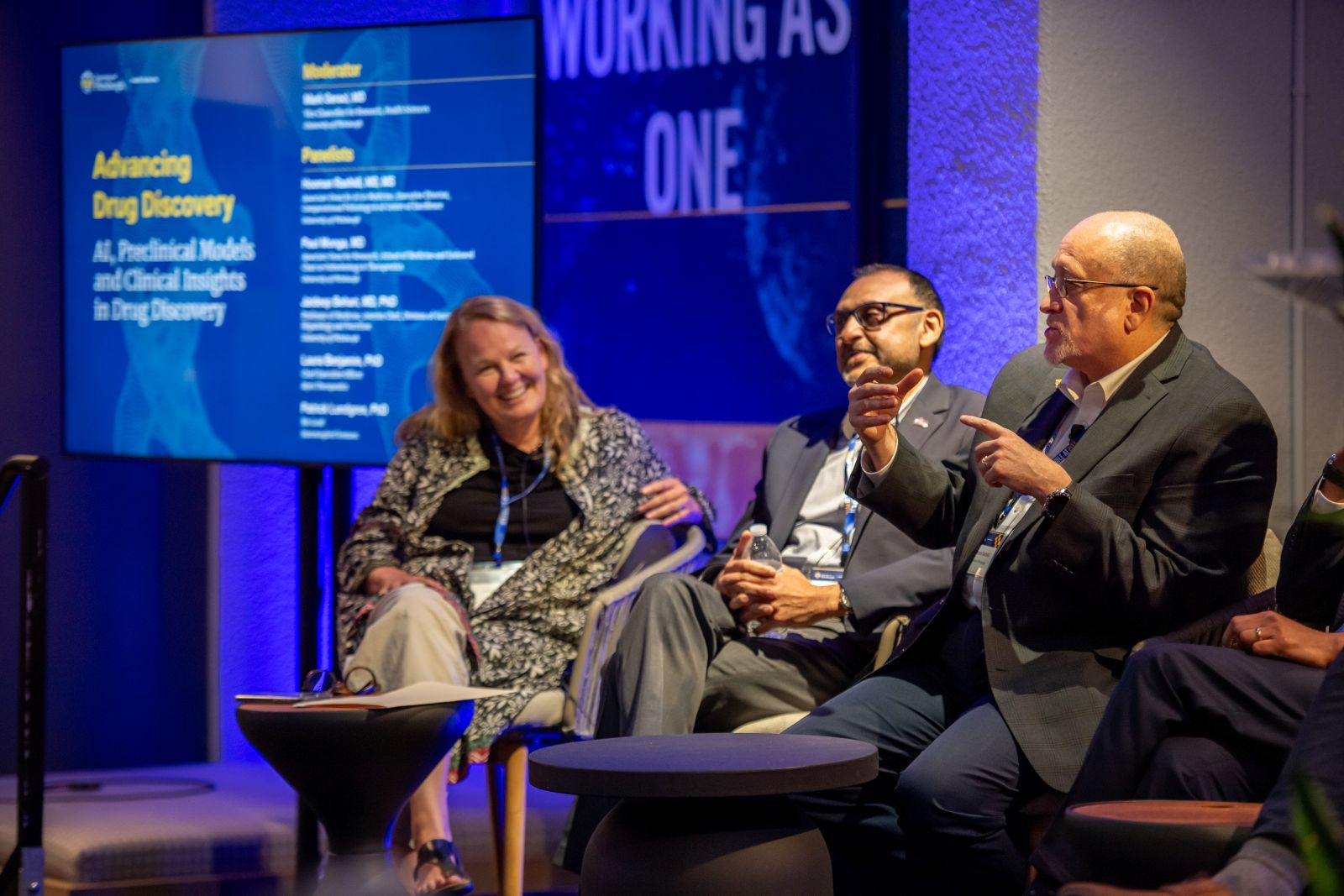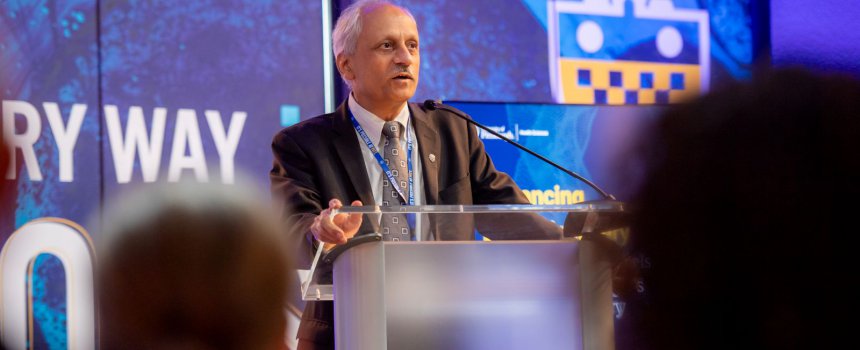In a hotel named for Paul Revere, whose daring midnight ride through the Boston countryside warned that the British were coming, the University of Pittsburgh declared that it is poised to lead revolutionary change in drug discovery and health care delivery.
“Over the next five years, we will transform the way medical research is done. We will transform the way drug discovery is done. And we definitely want to transform the way new products are done,” said Anantha Shekhar, senior vice chancellor for the health sciences and John and Gertrude Petersen Dean, School of Medicine.
Speaking at a standing-room-only private reception hosted by Pitt Health Sciences titled “Leveraging AI, Preclinical Models & Clinical Insights in Drug Development,” Shekhar outlined a coalescing of talent, resources, and powerful collaborations that uniquely position Pitt to fulfill the promise of personalized medicine.
The June 17 event coincided with the BIO International Convention, the world’s largest annual biotechnology conference, bringing together industry, academia, government, and economic development agencies. Reception invitees included key members of the biotech industry and investment communities.
Shekhar pointed out that Pitt consistently ranks in the top 10 U.S. universities for funding from the National Institutes of Health. But he said Pitt’s strengths extend far beyond its exceedingly broad and deep research enterprise.
“We have an environment ripe for innovation. We are building the infrastructure and ecosystem that can take our research to the next level of product development, commercialization, and manufacturing,” he said.
One of the Pitt partnerships he is most excited about is with Boston-based ElevateBio, which is scheduled to open its second cell and gene therapy manufacturing facility within the next year at Pitt BioForge, a 185,000-square-foot facility rising on a former steel mill site along the Monongahela River in Pittsburgh’s Hazelwood neighborhood.
Shekhar said current processes for manufacturing cell and gene therapies are expensive and time-consuming. By combining AI and robotics in tandem with ElevateBio and Carnegie Mellon University, he said, highly automated “closed-loop” manufacturing systems can be created to develop new biologic products quickly and inexpensively.
“We want to not only discover the next gene therapy or the next cell therapy but also be able to produce it within one week and for less than $50,000,” he said, adding that biotech companies have begun establishing a foothold in Pittsburgh to take advantage of these new capabilities.
Harnessing AI for Health Care
Another way Pitt is transforming medicine is by harnessing the power of artificial intelligence.
Shekhar said the new GainMED platform that Pitt is developing with its partner Vizzhy Inc. will help health care providers and researchers go beyond traditional medical records and lab reports to create a “digital twin” of individuals that captures the full scope of their biology. When combined with data on their activities and behaviors, it can deliver on the promise of personalized medicine.
“How do we use generative AI and agentic AI to augment their nurse practitioner, or their dashboard at the doctor’s office, or have their pharmacogenetic information available at the pharmacy to avoid bad drug interactions,” he said.
Following Shekhar’s presentation, a panel featuring prominent Pitt researchers led by Mark Geraci, Pitt’s vice chancellor for research, health sciences, expanded on the themes he presented.
Hooman Rashidi, associate dean of AI in Medicine and executive director of the Computational Pathology & AI Center of Excellence (CPACE), said that CPACE’s ability to create synthetic data or “replica patients” can complement real patient data to accelerate drug discovery.
“Our clinicians come up with brilliant ideas every day. Imagine a world where you come up with a brilliant idea, and you’re creating an area where people can test out their ideas nearly immediately,” he said.

Rashidi said Pitt’s AI capabilities will increasingly unlock new partnerships with industry and other academic institutions.
For example, Pitt recently partnered with Leidos Inc. to accelerate the use of AI in disease detection.
Supercharging Drug Discovery and Clinical Trials
Paul Monga, director of the Organ Pathobiology and Therapeutics Institute and the Pittsburgh Liver Research Center, provided deeper insight into the value Pitt can provide to potential partners.
“What people need to know about Pitt is that its academic culture is incredibly collaborative when you look at the kind of centers and institutes that exist here,” he said. “This dialogue between our physicians and scientists helps recognize unmet needs and build pre-clinical models of the utmost clinical relevance for testing therapies.”
Monga said Pitt leans into its heritage as the pioneer in organ transplantation by cutting explanted tissue into microscopic slices to create “organs on a chip” that can be used to study a patient’s disease progression and potential response to therapy.
He also said Pitt is home to some of the most robust mouse models of disease.
“In liver cancer, we have developed preclinical mouse models which represent 30-35 percent of all patients. This is very useful for working with partners to take therapies to clinical trials,” he said.
Jaideep Behari, associate director of the Pittsburgh Liver Research Center, said another unique advantage for drug discovery and clinical trials is the dual roles many Pitt researchers fill as scientists/clinicians, and the large patient volumes they can draw from for clinical trials.
“The biggest challenge in drug development [is that] if you have an exciting new molecule or oncology drug, there is a high probability that it will fail. At Pitt, we have the volumes and the complexity and the variability of the clinical phenotypes to leverage for effective trials.”
He pointed to his center’s enrollment of a 1,000-patient cohort for the study of metabolic fatty liver disease.
“We have all their biospecimens for proteomics, genomics, metabolomics, etc. More importantly, we have physical activity and dietary data that patients provide us at prespecified periods. So, if you have a drug not performing, you can learn if that is because it’s truly not effective, or because of the patients’ lifestyle.”
Austin Price, vice president of external affairs for the Pittsburgh Life Sciences Alliance, closed out the evening with a persuasive pitch for Pittsburgh’s emergence as a top-tier life sciences hub.
He said a company like Abridge, a Pittsburgh startup from a Pitt-trained physician, is emblematic of the dynamic growth of Pittsburgh’s life science sector. Abridge recently announced a $300 million fundraising round, valuing the company at more than $5 billion.
Price said the fast-emerging Pittsburgh life sciences sector is still in the early stage of its ascent and can grow to triple its current size.

Evan Facher, Pitt’s vice chancellor for innovation and entrepreneurship and associate dean for commercial translation at the School of Medicine, who served as the emcee for the evening, said that the Boston reception showcased what is possible at Pitt for an influential audience of the biotech industry.
“We are working day in and day out to build new collaborations and partnerships that will propel the exponential growth of the Pittsburgh life sciences sector,” he said. “It is an exciting time to partner with Pitt.”
